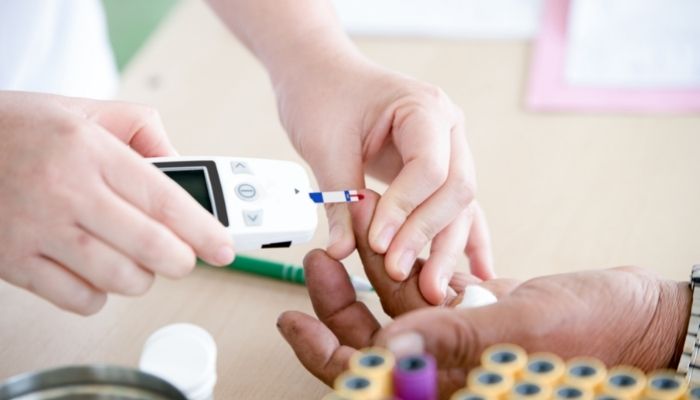A fasting blood sugar test measures how efficiently a person manages his/her blood sugar (glucose levels). This simple and convenient test is usually performed to check diabetes, prediabetes, and gestational diabetes. High levels of fasting sugar test indicate insulin resistance or diabetes. This test is also called the fasting glucose test.

A fasting blood test price is Rs.50 - Rs.300, depending on your location and place. Please check the price of diabetes blood tests in Delhi/NCR, your nearby centers, and other details.
Test Summary
| Is Also known as | Blood sugar fasting, fasting glucose test |
| Test Type | Blood |
| Blood sugar fasting test includes | Monitoring your blood sugar level |
| Preparation | Fasting for 10-12 hrs. before the test |
| Reporting | Within 24 hrs |
| Test price | Blood sugar fasting test price is generally between Rs. 50 - 300 |
| Also included in | Health Insurance Plans |
| Related tests | HbA1c, kidney function test, liver function test |
What is a Fasting Blood Sugar Test?
This is a simple and safe blood test to screen for diabetes, prediabetes, and gestational diabetes (during pregnancy). The fasting blood sugar time is 10-12 hours. You can’t drink or eat anything for at least 10-12 hrs. before the test.Who should perform a Fasting Blood Sugar Test?
Healthcare professionals usually recommend this test under the following conditions.- As a part of regular health check-ups to monitor a person’s blood sugar level
- For pregnant women to ensure that pregnancy hormones are not causing diabetes
- If a person has symptoms of diabetes like frequent urination, feeling thirsty, blurred vision, fatigue, etc.
- A family history of diabetes or obesity
- If your previous blood sugar level was higher than normal
How does Blood Glucose Work?
Blood sugar or glucose is the prime source of energy that is commonly found in your blood. Once you eat or drink, your body breaks down carbohydrates in the food or liquid into sugar for energy.The pancreas produces insulin hormone that helps blood sugar enter your body’s cells. When your cells use blood sugar, glucose and insulin levels in the blood decrease gradually.
But if you have diabetes, your body can’t regulate glucose. Either your pancreas doesn’t produce adequate insulin, or your body can’t process insulin efficiently. Thus, the sugar level in your blood becomes higher than normal. A lot of glucose is harmful to your body.
A fasting blood glucose test measures the amount of glucose in your blood when the value will be the lowest. This test is usually performed in the morning and you should avoid eating or drinking for at least 10-12hrs.
During the Test
A fasting blood sugar test draws a normal blood sample from your body. Let’s take a look at the test procedure.- First, you need to visit your nearby labs or hospitals to perform the test
- A healthcare technician will clean the area inside your elbow to kill any germs
- Then, he will tie a plastic rubber band in your upper arm to identify the vein from which the sample should be taken
- Then, he will insert a small needle into the vein (preferably in the upper arm)
- Now, your collected blood sample will be kept in a tube
- The technician will remove the band and then the needle
- He will place a bandage on the punctured area
The Results and Interpretation
You will get your results on the same day or within 24 hours.The results of the fasting blood sugar test can be explained in the following way.
- 99 mg/dL or lower: This is a normal blood sugar level
- 100–125 mg/dL: This range indicates that you have prediabetes. This portrays that your sugar levels are higher than normal but not high enough to be considered diabetes.
- 126 mg/dL or above: This indicates you are having diabetes


